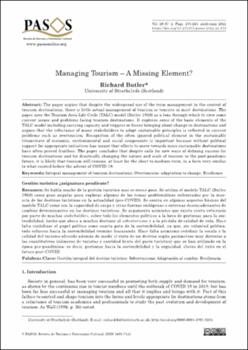Managing Tourism – A Missing Element?
Fecha
2022Resumen
Se habla mucho de la gestión turístico mas se ejerce poco. Se utiliza el modelo TALC (Butler
1980) como gran angular para explorar algunos de los temas problemáticos enfrentados por la may‐
oría de los destinos turísticos en la actualidad (pre‐COVID). Se centra en algunos aspectos básicos del
modelo TALC como son la capacidad de carga y otras fuerzas endógenas o externas desencadenantes de
cambios determinantes en los destinos turísticos. Se argumenta asimismo que exista cierta reticencia
por parte de muchos stakeholders, sobre todo los elementos políticos a la hora de gestionar para la sos‐
tenibilidad, hecho que aboca a muchos destinos al sobreturismo y a la pérdida de calidad de vida. Hace
falta visibilizar el papel político como cuarta pata de la sostenibilidad, ya que, sin voluntad política,
todo esfuerzo hacia la sostenibilidad termine fracasando. Hace falta asimismo redefinir la escala y la
calidad del turismo ofrecido además de medir el éxito de un destino según parámetros muy distintos a
los cuantitativos (números de turistas y cantidad bruta del gasto turístico) que se han utilizado en la
época pre‐pandémica: es decir, gestionar hacia la sostenibilidad y la seguridad, claves del éxito en el
futuro post‐COVID. The paper argues that despite the widespread use of the term management in the context of
tourism destinations, there is little actual management of tourism or tourists in most destinations. The
paper uses the Tourism Area Life Cycle (TALC) model (Butler 1980) as a lens through which to view some
current issues and problems facing tourism destinations. It explores some of the basic elements of the
TALC model including carrying capacity and triggers or forces bringing about change in destinations and
argues that the reluctance of many stakeholders to adopt sustainable principles is reflected in current
problems such as overtourism. Recognition of the often ignored political element in the sustainable
triumvirate of economic, environmental and social components is important because without political
support for appropriate initiatives has meant that efforts to move towards more sustainable destinations
have often proved fruitless. The paper concludes that despite calls for new ways of defining success for
tourism destinations and for drastically changing the nature and scale of tourism in the post‐pandemic
future, it is likely that tourism will resume, at least for the short to medium term, in a form very similar
to what existed before the advent of COVID 19. The paper argues that despite the widespread use of the term management in the context of tour‐
ism destinations, there is little actual management of tourism or tourists in most destinations. The paper
uses the Tourism Area Life Cycle (TALC) model (Butler 1980) as a lens through which to view some current
issues and problems facing tourism destinations. It explores some of the basic elements of the TALC model
including carrying capacity and triggers or forces bringing about change in destinations and argues that
the reluctance of many stakeholders to adopt sustainable principles is reflected in current problems such as
overtourism. Recognition of the often ignored political element in the sustainable triumvirate of economic,
environmental and social components is important because without political support for appropriate initia‐
tives has meant that efforts to move towards more sustainable destinations have often proved fruitless. The
paper concludes that despite calls for new ways of defining success for tourism destinations and for drastical‐
ly changing the nature and scale of tourism in the post‐pandemic future, it is likely that tourism will resume,
at least for the short to medium term, in a form very similar to what existed before the advent of COVID 19.





